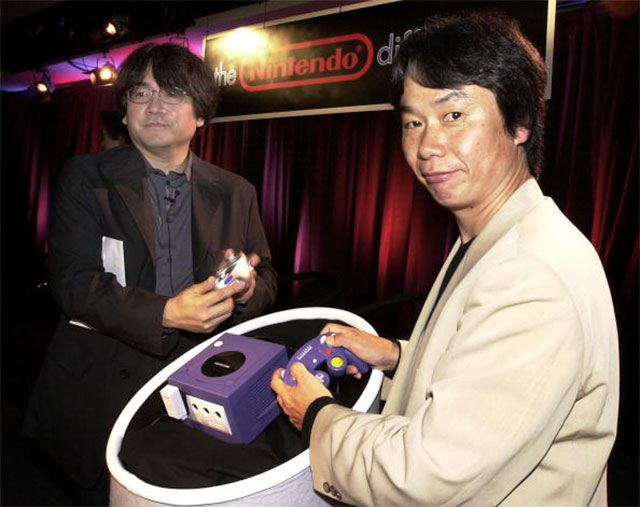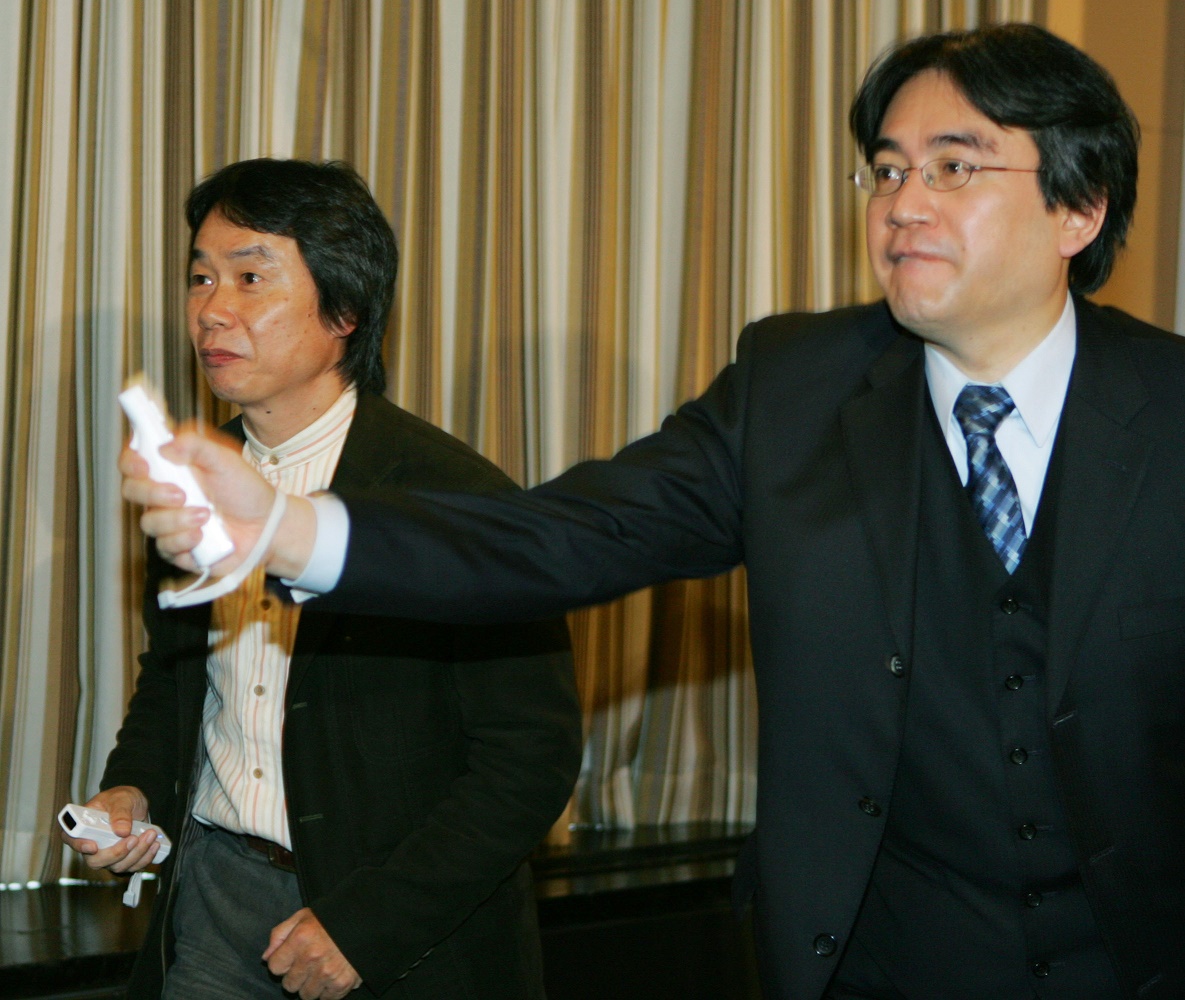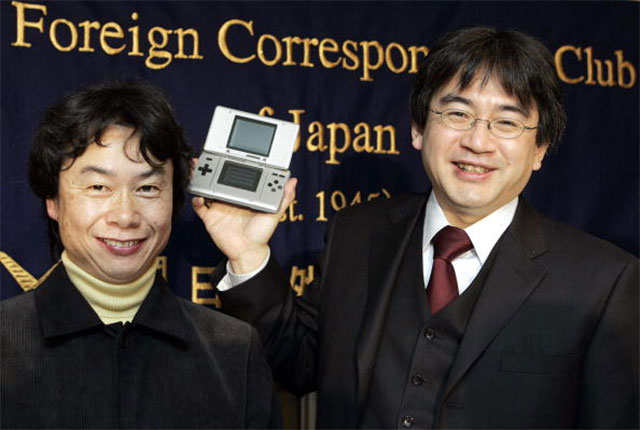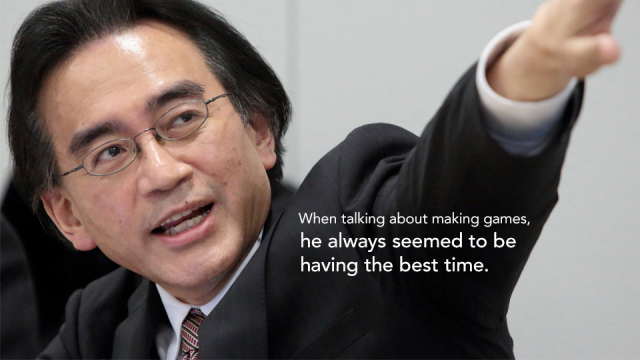By some measures, Satoru Iwata was the most successful video game creator to have ever lived: a kid who played Pong; a young man who started a development studio with friends; and eventually at 42, the CEO of the most beloved company in his medium’s history.
“On my business card, I am a corporate president,” he said in a speech to thousands of attendees of the Game Developers Conference in San Jose, California in 2005, just three years after he’d become the head of Nintendo. “In my mind, I am a game developer. In my heart I am a gamer.”
For some people, video games are simply big business, measured in the billions of dollars they earn relative to Hollywood. For others, they are art, and for still others a favourite pastime. Iwata, who passed away on Saturday at the age of 55, long lived at the nexus of those views. He wore a suit and ran a corporate goliath, but he was playful and serene, ever eager to talk more about making and playing games than selling them. For him, the business view seemed to take third place.
He succeeded Hiroshi Yamauchi, CEO of Nintendo for 53 years, a man of imperious reputation and apparent limited interest in playing the video games his company had thrived in making since the early 1980s. Yamauchi was the career business man, Iwata the career game creator, the programmer who helped give the world Balloon Fight, Earthbound and the puffball gaming hero Kirby through the studio he’d run, HAL Laboratory.

Above: Iwata with Nintendo’s chief game designer, Shigeru Miyamoto (right), in 2001. Photo: Lucy Nicholson, Getty Images
Iwata’s own game development seemed to cease when he took over Nintendo in 2002, though he told me in 2006 that he was missing it. “Recently I have gained a little bit of interest in getting more involved in game development again,” he said when we talked in San Jose. But he feared he was too busy running a company. He was, and never released any new games of his own creation.
He did, however, publicly revel in the work of the game developers who worked for him like no CEO in the industry’s history before. His recurring Iwata Asks interview series presented the Nintendo boss as Nintendo chronicler, playfully peppering his own game developers with questions about why and how they made the games they were making. My own favourite moment from that excellent series came in a discussion about a 2006 Wii game called WarioWare Smooth Moves that briefly turned to a reminiscence about the prototyping of an earlier portable WarioWare game designed to work with a sensor that could detect rotational movement:
Satoru Iwata: Well, to cut a long story short, I put the Game Boy Advance on top of a swivel chair, and rotated the chair. When I did this, the record player in the game matched the movement and started turning! (laughs)
All: (laughter)
Iwata: Not only that, but the speed of the music changed according to how fast the chair was being spun! (laughs) I spent ages spinning that chair round! (laughs)
Yoshio Sakamoto: You really did! (laughs) I’ll never forget that time either because as Iwata-san was spinning that chair round and round, he’d occasionally say: “This is ridiculous!” with a big grin on his face! (laughs)
The above excerpt does not include a disproportionate amount of laugher for an Iwata Asks. When talking about making games, he always seemed to be having the best time.
I interviewed Iwata three times, in 2004, 2006, and 2012. In Nintendo epochal terms, that was before the launch of the Nintendo DS when people thought Nintendo was doomed; after the DS was a huge hit but before the Wii, when people thought Nintendo might still be doomed; and before the launch of the Wii U at a time when doubters predicted that mobile phones would destroy Nintendo’s handheld gaming empire and that the company would be doomed.
All three times he seemed preternaturally serene. He had none of the aloofness of some of his peers. He exuded a sweetly toned, smiling certainty that his path, his company’s path, was right. He was correct, at least the first two times. The DS and the Wii were, in rapid succession, both monstrous hits. With them, Iwata presided over a second Nintendo golden age, the second time since the 1980s when conventional wisdom failed to predict that a zigzagging Nintendo was about to dominate the video game scene.
“If all we were to ever do is just continue to make sequels and not do anything new or different, people would view us as a very conservative company and a company that is unwilling to really take new initiatives and embark on new adventures,” he told me in 2006. “That’s not the type of person I am and not the kind of company I want Nintendo to be.”

Above: Iwata playing Wii with Miyamoto in 2006. Photo: Koji Sasahara, AP
He loved games and lamented, likely for business and personal reasons, how many people did not. “There’s people in the house that don’t play video games whatsoever,” he said, just months before Nintendo introduced the world to Wii Sports tennis. “When people see what we have to offer at E3, they’re going to understand that that wall’s been broken down and we now have created a system that’s going to allow for a much, much larger user base than any system we’ve seen before.”
In 2012, with predictions that Apple was about to obliterate Nintendo’s run as the king of handheld gaming, Iwata consulted his Macbook, which sat next to his white iPhone, and read me stats about the Nintendo 3DS’ success.
“I think that if we are able to provide experiences on handheld devices that consumers cannot get on another device, then we will continue creating software and hardware going forward,” he said. “And if it comes to a point when we’re not able to do that, I think, yeah, you will see portable handheld gaming devices go the way of the Dodo, I guess.”
In that final interview of ours three summers ago we squeezed in some talk about his hope for Nintendo’s new social media service, Miiverse, to help gamers connect to each other more freely and playfully as gamers did on the playground when Mario and Zelda were first coming out. “What we really want to do,” he said, “is create a place where folks who are playing by themselves will not feel like they are playing by themselves.”
We spoke about the appeal of Super Mario Bros. games. “Sidescrolling Mario has a special existence in that it really is part of the fundamental DNA of gamers,” he told me, going on to liken, with perhaps a bit of unintentional self-revelation, playing through a Mario sidescroller to “sort of almost in a managerial sense a checklist of the things you have to do to get from here to here.” I liked thinking of Iwata as treating his tenure as Nintendo’s main manager as his own World 1-1 through 8-4.
While cheerful and relaxed, Iwata was literally more buttoned up for interviewers like me, as well as for investors, who in recent years seemed more sceptical of his vision. He’d been right steering Nintendo from the successful Game Boy Advance to the freakishly phenomenal Nintendo DS, lifting it from the sputtering GameCube to the steamrolling Wii. He’d only recently announced Nintendo’s partnership with a mobile gaming company, only recently committed his company to start making games not just for its own platforms but also for mobile phones.
He’d missed recent E3 shows and had visibly lost a great deal of weight in what had become a public battle with cancer. The recent return of his Iwata Asks series — on hiatus for a year — and his renewed appearance in Nintendo Direct videos were signs that Iwata’s health problems might be past and, perhaps with a move to whatever followed the faltering Wii U, Nintendo’s business problems would pass, too. Of course, one thing hadn’t needed mending: the quality of Nintendo’s games, which remained — regardless of whether Nintendo’s stock price under Iwata was up or down — fun, fresh and, many times, daring.

Above: Miyamoto and Iwata famously joyful about the Nintendo DS in 2004. Credit: Toshifumi Kitamura, Getty Images
A couple of years ago, I mentioned to Nintendo’s long-time chief game designer, Shigeru Miyamoto, that I was consistently impressed with the Iwata Asks series. The Nintendo boss always got such interesting information out of his employees, including from Miyamoto. He laughed. It was probably because the two of them took such long lunches every week, he suggested. That’s the ideal image of the late Satoru Iwata, the CEO regularly dining with the man who cooked up Donkey Kong, Mario and Zelda. Picture Iwata; the cheerful, resolute and maybe stubborn executive who couldn’t, at heart, resist caring about game creation.
Enormously enthusiastic for game design in his own right, Miyamoto would come to be known as the game development boss who’d metaphorically flip the table to challenge the people working with him. Iwata was the guy who’d put a Game Boy on a chair and spin it, to rejoice in what game developers could think of next.

Comments
4 responses to “The Game Maker Who Became CEO: What Satoru Iwata Meant To Nintendo”
Such a sad time for Nintendo and a lot of gamers.
It will be interesting to see where they go next.
What a great article. People moan about the current state of Nintendo (and the misfire of the Wii U (despite the obvious quality of the games it runs) but one thing is clear – Iwata always cared, and the decisions he made always had gamers at the forefront. Whether a fresh audience they were chasing or creating familiar experiences for long-term fans, Nintendo’s ethos permeates every aspect of their platforms.
Lets hope the new CEO doesn’t get it into his head that a mobile, free-to-play Mario title where you wait five minutes for a 1-up or pay 99 cents for ten is a good revenue raiser.
Really looking forward to hear Miyamoto’s take.
The passing of a great man- possibly the only major game company CEO who actually gave a shit about the games his company made, rather than just the profit they made. A developer and businessman who was actually a gamer himself and one of the few businessmen in the industry I could actually respect. The gaming world is much poorer for his passing.
God it’s been a terrible year, hasn’t it? Leonard Nimoy, Terry Pratchett, Christopher Lee and now Satoru Iwata, and this after losing Robin Williams last year. I’m starting to fear for the life of John Cleese.
Great article, made me tear up a little.